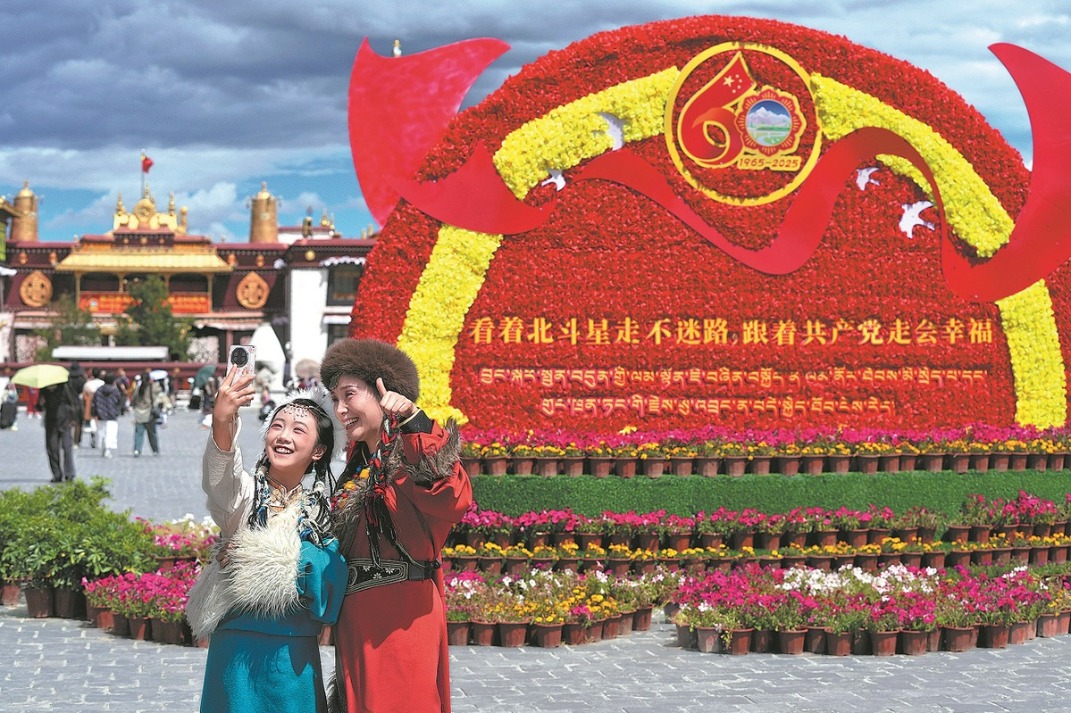78% of Asians in US treated as foreigners
Survey cites discrimination in daily encounters over race and ethnicity

A couple of months ago, Natalie (last name withheld for privacy), a young professional in her 20s, went to a local Oktoberfest in the Dallas area.
"I was asking a guy to order some pretzels, and he said to me: 'Wow, you speak very good English.' I replied: 'Oh, thank you. It is the only language I speak,'" said Natalie.
Natalie, who is ethnically Chinese and was born and raised in the United States, was assumed by the man as an outsider and non-American, purely based on her looks.
Her experience is quite common among Asian Americans, according to a recent survey by Pew Research Center.
The data, collected from a nationally representative survey of 7,006 Asian adults over six months between 2022 and 2023 and 66 focus groups, show that a majority of adult Asian Americans — 78 percent — have been treated as foreigners, even if they are born in the US as Natalie was.
The survey showed that most Asian Americans experience discrimination in three broad ways: being treated as a foreigner; being seen as a model minority; and other incidents of discrimination in day-to-day encounters because of their race or ethnicity.
"I have had this kind of incident a couple of times before. It's not that big a deal. People are not trying to be rude or aggressive, but it shows that when people look at you, that's their first impression and what they are thinking: Oh, you are not from here; you are from somewhere else."
Coming from a diverse neighborhood in Houston, Texas, Natalie said she didn't experience such "outsider" incidents while growing up. But it's different for her boyfriend, a Filipino, who went to a private Christian school.
Because his last name sounds like a Mexican name, other students jokingly called him Mexican. By making fun of his last name, "they were like: You are not one of us", Natalie said.
Some outsider experiences turned out to be much harsher than what Natalie had. "I had my assigned parking lot, and when a white man parked his car on my spot, I told him to move his car, he said 'Ching, Chang, Chong' to me and called the guard," an immigrant man of Korean descent in his late 40s told Pew.
A man of Filipino descent born in the US was invited to a party by his white girlfriend at her uncle and aunt's house. Being helpful, he brought in a tray of food from outside. The aunt automatically assumed he was one of the caterers, got upset and asked him to use the rear service door.
"That's just one example of many, that much racism I've had when I've interracially dated," he told Pew.
The survey showed that about 9 in 10 Asian Americans have experienced at least one of the 17 discrimination incidents asked about in the survey. The most common incidents are that strangers mispronounced their names (68 percent) or assumed that they are good at math and science (58 percent).
In Natalie's case, her name wasn't mispronounced; she was called by a wrong name by her former supervisor.
"In my last job, the director at my department kept getting me and another Asian girl mixed up. It was crazy to me," said Natalie. "We didn't look alike at all, we didn't sound alike — she has some accent, and I don't, and our names are totally different. Yet he kept calling us by the other's name. After a while I felt like, he's not even trying."
Denied raise, promotion
The survey found that about 20 percent of Asians experienced discrimination at the workplace, and they were denied a raise or promotion due to their race.
Discrimination incidents experienced in day-to-day life can be subtle.
"One time we went to a restaurant and our waitress was kind of cold. I don't really hold it against her because sometimes people just don't feel friendly," said Natalie.
"Then, a white couple came in sitting right next to us, and her mood just shifted. She became super friendly like 'How's your day', and laughing. The contrast was stark."
The Pew survey found that 40 percent of Asian adults say they have received worse service than other people at restaurants and stores.
While some incidents are minor and annoying at most, other discrimination incidents can be quite unpleasant. The survey found that about 35 percent of South Asians say they have been held back at a security checkpoint for a secondary screening because of their race or ethnicity.
Some discrimination can turn violent. The survey found that 32 percent of Asian adults say they personally know an Asian in the US who has been threatened or attacked.
A Korean immigrant told Pew that once when she was walking in the city, an elderly white person poked her in the face saying: "You are disgusting," and tried to hit her. "I ran away crying," she said.
Overall, 57 percent of Asian adults see discrimination against Asians living in the US as a major problem, and 63 percent say too little attention is paid to race and racial issues concerning Asian Americans.
Today's Top News
- China, Japan, ROK urgently need an FTA
- From humanoids to parallel intelligence
- Shared wartime history unites nations, envoy says
- Mutual trust reaffirmed in visit
- 12 dead, 4 missing after bridge collapses in Qinghai
- Steps taken to boost domestic consumption






























